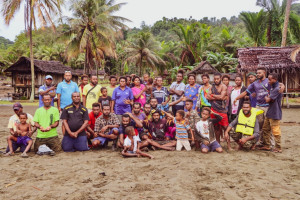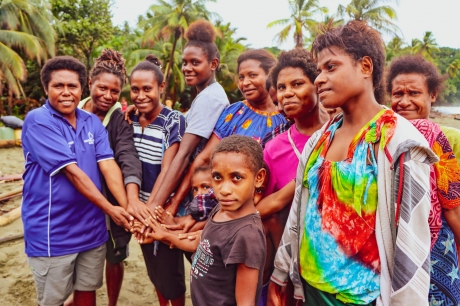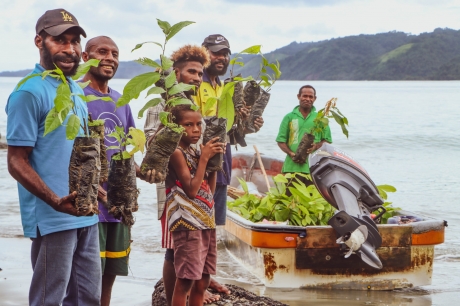
Hallilah mentors and supervises student trainees who have come to work in the community. Her vision is for her community to become a role model in the country. All photos©FAO
Hallilah transforms her education into better livelihoods for people in her island country

Bittersweet is how Hallilah Nakumai sums up life in Dandan village on the east coast of Papua New Guinea’s main island, where she grew up. It was a childhood spent canoeing, fishing, weaving grass skirts and colourful bags, gardening, clearing bushes and learning about the ceremonies of her culture.
But the realities of her remote, rural surroundings in the flood-prone hinterland of the mighty Sepik River were harsh.
Many rural communities in Small Island Developing States (SIDS), like Papua New Guinea, are increasingly impacted by extreme weather as a result of climate change. These island states also face geographic limitations in terms of access and trade of goods and food and generally overly rely on imports.
It was the harsh realities that motivated her to work to improve the livelihoods of people in her village.
Hallilah’s village was 6 kilometres away from the nearest road. Therefore, the cocoa, fish and vanilla produced in the village would only reach the market late after a long walk. “Families can only buy a few basic needs and find it hard to support their children’s education,” she says.
The local primary school was also a long walk, 2.5 hours away, and many of the other village children dropped out as a result.
But Hallilah’s parents took her schooling very seriously, helping set her on a path to university studies and a leadership role in the community.
“My parents weren’t just concerned about my or my siblings’ education, they actually took action,” cultivating gardens and washing sago, a starch and staple food in this region, to pay the school fees. They also “worked with us when we came back from school with test topics or assignments to do and gave us smart ideas to tackle them.”
The family’s sacrifices and determination paid off. In a rare opportunity for a young woman from her village, Hallilah packed her bags first for boarding school and then for a four-year bachelor’s degree course in Sustainable Tropical Agriculture at the Papua New Guinea University of Natural Resources.
She took away invaluable agricultural expertise, diving deep into plant and animal breeding techniques, biotechnology, agribusiness and entrepreneurship.
Among the other important things the university taught her were also “how to take charge of your learning, become a disciplined, time management whiz, become a pro at navigating tough conversations, seek help, strengthen your integrity and gain perseverance.”


All this was to prove its value as she returned to her village in 2020. Hallilah became the treasurer and coordinator for the SISIDA cooperative, a rural business group bringing together three local communities. (SISIDA is a combination of the names of Sir, Sikan and Dandan villages.)
She soon sought and received the support of the European Union-funded and the Food and Agriculture Organization of the United Nations (FAO) – implemented Support to Rural Entrepreneurship, Investment and Trade and in Papua New Guinea (EU-STREIT PNG) programme to streamline and upgrade the agrifood production of the communities.
FAO and the European Union (EU) have a particular focus on supporting SIDS in the face of these complex challenges.
Giving Hallilah and her community the backing she needed after she returned to her village was just one effective example of how that’s being done.
Linking up with the programme provided Hallilah and her fellow villagers with training and vital farming inputs to better protect their cocoa crops from pests and assist in farming tilapia. It also facilitated farmers’ access to banking facilities.
Hallilah’s daily work now involved everything from supervising and giving technical advice to the cocoa, fish, vanilla and livestock farmers to report writing and outreach work.
Despite a lack of operating cash and needing to explain the concept of a cooperative to villagers for whom it’s unfamiliar, she stayed determined.
Redefining women’s roles
Not surprisingly, the role can also have its frustrations. Among the issues she encountered were the farmers who didn’t have confidence in her. “They say, ‘she is a woman, she will get married soon and leave and the project will collapse.’ I also receive backbites about being a female to run this project and the knowledge I have graduated with,” confided Hallilah. She said that her father Denny, who serves as the SISIDA cooperative’s chairman, has been a great source of support, urging her not to give up.
Hallilah also acts as a supervisor for the student trainees from her old university, who’ve come to work in the community. She offers young people advice and shares her experience with them. She says that the key is to think ahead about what higher education courses will “critically benefit your homes, families, and communities” and when you’ve graduated and returned to your community, “don’t wait but put it into action.”
Leadership, Hallilah said, “is truly not the simplest thing” and involves sacrifices. “It means you must learn to be patient enough, to humble yourself, to always put yourself last” and avoid being aggressive and conceited. Above all, she urged, learn to be positive in all you do and never give up.
Putting this advice into practice, Hallilah is working toward her vision of getting more young people involved and of SISIDA becoming a role model for agriculture and rural development in Papua New Guinea.
Source: the FAO News and Media office
– global bihari bureau





